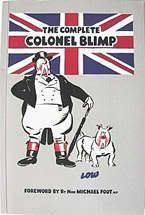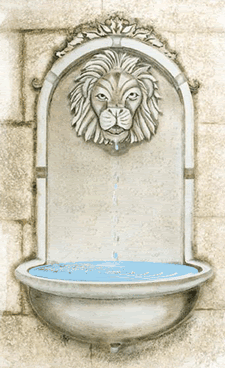Blimpophobia
 It may well be that the future historian, asked to point to the most characteristic expression of the English temper in the period between the two wars, will reply without hesitation, "Colonel Blimp".* No popular cartoonist can work in a vacuum. A nation must be in a certain state of mind before it can accept the kind of satire which Mr. Low was then offering. And we all remember what that state of mind was. We remember also what it led to; it led to Munich, and via Munich to Dunkirk. We must not blame Mr. Low (or Mr. Chamberlain or even Lord Baldwin) much more than we blame ourselves. All of us, with a very few exceptions, shared the guilt, and all, in some measure, have paid for it.
It may well be that the future historian, asked to point to the most characteristic expression of the English temper in the period between the two wars, will reply without hesitation, "Colonel Blimp".* No popular cartoonist can work in a vacuum. A nation must be in a certain state of mind before it can accept the kind of satire which Mr. Low was then offering. And we all remember what that state of mind was. We remember also what it led to; it led to Munich, and via Munich to Dunkirk. We must not blame Mr. Low (or Mr. Chamberlain or even Lord Baldwin) much more than we blame ourselves. All of us, with a very few exceptions, shared the guilt, and all, in some measure, have paid for it.For this state of mind many causes might be given; but I want at present to draw attention to one particular cause which might be overlooked. The infection of a whole people with Blimpophobia would have been impossible but for one fact--the fact that seven out of every ten men who served in the last war, emerged from it hating the regular army much more than they hated the Germans. How mild and intermittent was our dislike of "Jerry" compared with our settled detestation of the Brass Hat, the Adjutant, the Sergeant-Major, the regular Sister, and the hospital Matron! Now that I know more (both about hatred and about the army) I look back with horror upon my own state of mind at the moment when I was demobilized. I am afraid I regarded a Brass Hat and a Military Policeman as creatures quite outside the human family.
~C.S. Lewis, Present Concerns, "Blimpophobia" (1st pub. in Time and Tide, Sept. 9, 1944)
*David Low won great acclaim for his cartoons which appeared in the Evening Standard for whom he worked from 1926 to 1949. His most famous creation was "Colonel Blimp" who was portrayed as a bald, rotund, elderly gentleman delivering himself of self-contradictory aphorisms. He has come to mean a muddle-headed type of complacent reactionary.




0 Comment(s):
Post a Comment
<< Home